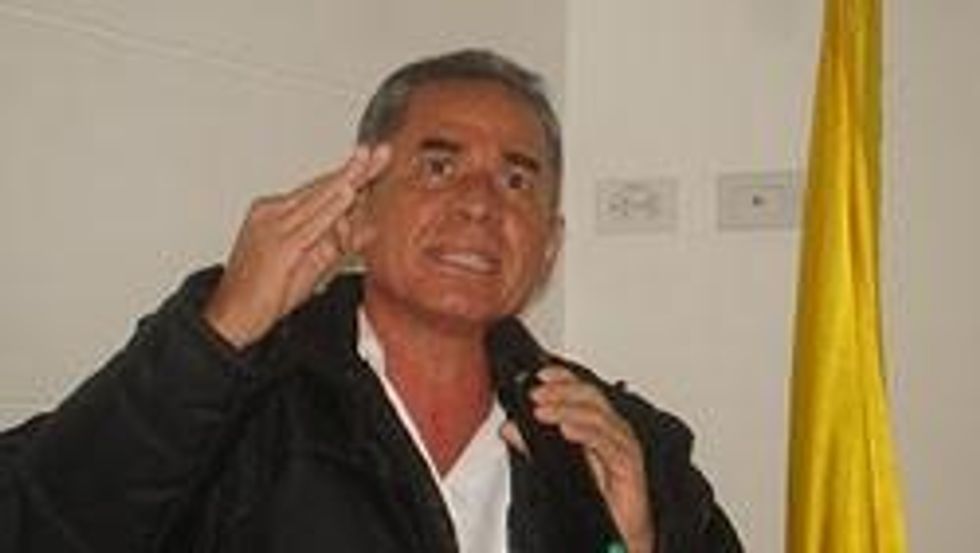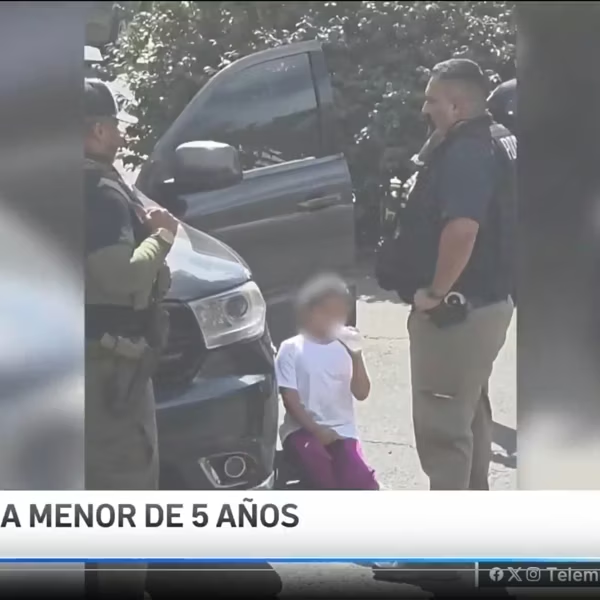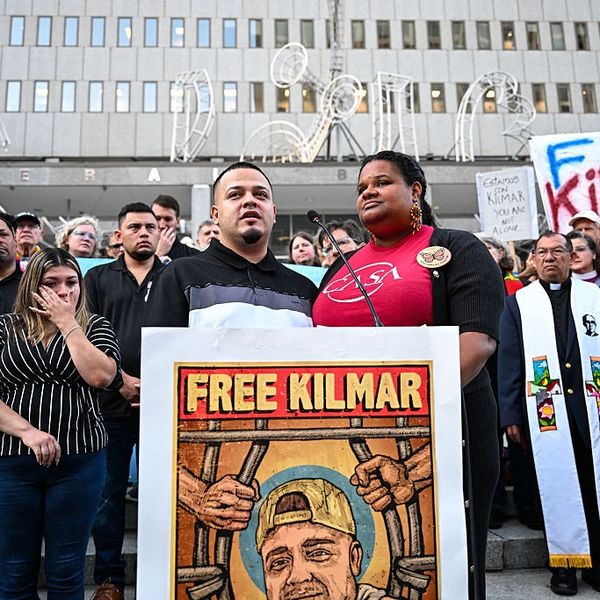Colombian Prosecutor Charging Human Rights Defender is Implicated in Forced Disappearance
After years of enduring threats from paramilitary organizations, David Ravelo, a Colombian human rights defender, economist and founding member of the Regional Corporation for the Defense of Human Rights (CREDHOS), has been imprisoned for the last two years based on the testimony of demobilized paramilitaries. The circumstances surrounding the case against him are filled with irregularities, including accusations of witness tampering and serious questions about witness credibility. And new information has just come to light that presents even more serious questions about the Ravelo's imprisonment.

In 1995, Ravelo was absolved of the charge of rebellion relating to the homicide of David Nunez Cala, a public official from the Mayor's Office in Barrancabermeja, but he is currently being held on charges of aggravated homicide related to the same incident. He remains imprisoned based on the testimony of just three former paramilitaries, though over 30 people gave declarations contradicting that testimony. The principle witnesses, Mario Jaimes Mejia, alias "El Panadero" (the Baker), and Fremio Sanchez Carreno, alias "Commando Esteban", are ex-paramilitaries, both of whom were sentenced to 20 years in prison for their involvement in a 1998 massacre that killed 7 and disappeared 25--a massacre publicly denounced at the time by Ravelo and CREDHOS. Furthermore, Orlando Noguera, another witness in the case, has publicly stated that Mejia and Carreno tried to bribe him so that he would implicate Ravelo, further eroding the ex-paramilitaries' credibility.
Alirio Uribe, Ravelo's lawyer, says, "It's no secret to anyone that paramilitary groups in Barrancabermeja and throughout the country have declared human rights defenders military targets, including ordering that they be killed, and now they are doing it through the legal system."1 For over a decade, Ravelo and has endured threats, many from paramilitary organizations, and since his imprisonment, threats have also been directed at his family members.
The latest revelations about Ravelo's prosecutor, William Pacheco, bring up several new questions about the legitimacy of Ravelo's trial. For instance, how can a person dismissed from public office become a Prosecutor for the Attorney General's office? How does a person with such a past become a Director of the National Association of Prosecutors or member of the Anti-Terrorism Task Force? And finally, what authority does a person with such a past have to investigate and try a recognized human rights defender like David Ravelo?
Amidst these serious questions about his trial, Ravelo still sits in jail, after more than two years, awaiting sentencing, which brings me to my final question: Is this justice?
An Urgent Message From Our Co-Founder
Dear Common Dreams reader, The U.S. is on a fast track to authoritarianism like nothing I've ever seen. Meanwhile, corporate news outlets are utterly capitulating to Trump, twisting their coverage to avoid drawing his ire while lining up to stuff cash in his pockets. That's why I believe that Common Dreams is doing the best and most consequential reporting that we've ever done. Our small but mighty team is a progressive reporting powerhouse, covering the news every day that the corporate media never will. Our mission has always been simple: To inform. To inspire. And to ignite change for the common good. Now here's the key piece that I want all our readers to understand: None of this would be possible without your financial support. That's not just some fundraising cliche. It's the absolute and literal truth. We don't accept corporate advertising and never will. We don't have a paywall because we don't think people should be blocked from critical news based on their ability to pay. Everything we do is funded by the donations of readers like you. Will you donate now to help power the nonprofit, independent reporting of Common Dreams? Thank you for being a vital member of our community. Together, we can keep independent journalism alive when it’s needed most. - Craig Brown, Co-founder |
After years of enduring threats from paramilitary organizations, David Ravelo, a Colombian human rights defender, economist and founding member of the Regional Corporation for the Defense of Human Rights (CREDHOS), has been imprisoned for the last two years based on the testimony of demobilized paramilitaries. The circumstances surrounding the case against him are filled with irregularities, including accusations of witness tampering and serious questions about witness credibility. And new information has just come to light that presents even more serious questions about the Ravelo's imprisonment.

In 1995, Ravelo was absolved of the charge of rebellion relating to the homicide of David Nunez Cala, a public official from the Mayor's Office in Barrancabermeja, but he is currently being held on charges of aggravated homicide related to the same incident. He remains imprisoned based on the testimony of just three former paramilitaries, though over 30 people gave declarations contradicting that testimony. The principle witnesses, Mario Jaimes Mejia, alias "El Panadero" (the Baker), and Fremio Sanchez Carreno, alias "Commando Esteban", are ex-paramilitaries, both of whom were sentenced to 20 years in prison for their involvement in a 1998 massacre that killed 7 and disappeared 25--a massacre publicly denounced at the time by Ravelo and CREDHOS. Furthermore, Orlando Noguera, another witness in the case, has publicly stated that Mejia and Carreno tried to bribe him so that he would implicate Ravelo, further eroding the ex-paramilitaries' credibility.
Alirio Uribe, Ravelo's lawyer, says, "It's no secret to anyone that paramilitary groups in Barrancabermeja and throughout the country have declared human rights defenders military targets, including ordering that they be killed, and now they are doing it through the legal system."1 For over a decade, Ravelo and has endured threats, many from paramilitary organizations, and since his imprisonment, threats have also been directed at his family members.
The latest revelations about Ravelo's prosecutor, William Pacheco, bring up several new questions about the legitimacy of Ravelo's trial. For instance, how can a person dismissed from public office become a Prosecutor for the Attorney General's office? How does a person with such a past become a Director of the National Association of Prosecutors or member of the Anti-Terrorism Task Force? And finally, what authority does a person with such a past have to investigate and try a recognized human rights defender like David Ravelo?
Amidst these serious questions about his trial, Ravelo still sits in jail, after more than two years, awaiting sentencing, which brings me to my final question: Is this justice?
After years of enduring threats from paramilitary organizations, David Ravelo, a Colombian human rights defender, economist and founding member of the Regional Corporation for the Defense of Human Rights (CREDHOS), has been imprisoned for the last two years based on the testimony of demobilized paramilitaries. The circumstances surrounding the case against him are filled with irregularities, including accusations of witness tampering and serious questions about witness credibility. And new information has just come to light that presents even more serious questions about the Ravelo's imprisonment.

In 1995, Ravelo was absolved of the charge of rebellion relating to the homicide of David Nunez Cala, a public official from the Mayor's Office in Barrancabermeja, but he is currently being held on charges of aggravated homicide related to the same incident. He remains imprisoned based on the testimony of just three former paramilitaries, though over 30 people gave declarations contradicting that testimony. The principle witnesses, Mario Jaimes Mejia, alias "El Panadero" (the Baker), and Fremio Sanchez Carreno, alias "Commando Esteban", are ex-paramilitaries, both of whom were sentenced to 20 years in prison for their involvement in a 1998 massacre that killed 7 and disappeared 25--a massacre publicly denounced at the time by Ravelo and CREDHOS. Furthermore, Orlando Noguera, another witness in the case, has publicly stated that Mejia and Carreno tried to bribe him so that he would implicate Ravelo, further eroding the ex-paramilitaries' credibility.
Alirio Uribe, Ravelo's lawyer, says, "It's no secret to anyone that paramilitary groups in Barrancabermeja and throughout the country have declared human rights defenders military targets, including ordering that they be killed, and now they are doing it through the legal system."1 For over a decade, Ravelo and has endured threats, many from paramilitary organizations, and since his imprisonment, threats have also been directed at his family members.
The latest revelations about Ravelo's prosecutor, William Pacheco, bring up several new questions about the legitimacy of Ravelo's trial. For instance, how can a person dismissed from public office become a Prosecutor for the Attorney General's office? How does a person with such a past become a Director of the National Association of Prosecutors or member of the Anti-Terrorism Task Force? And finally, what authority does a person with such a past have to investigate and try a recognized human rights defender like David Ravelo?
Amidst these serious questions about his trial, Ravelo still sits in jail, after more than two years, awaiting sentencing, which brings me to my final question: Is this justice?

